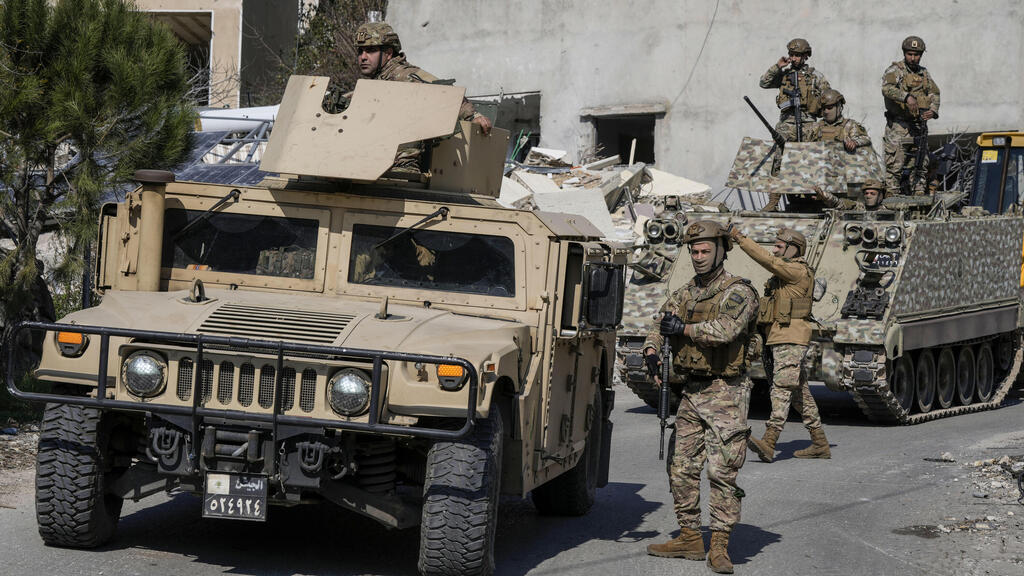Getting your Trinity Audio player ready...
The directive applies to operatives not originally from southern Lebanon and is intended to allow the Lebanese army to take control of the area under the terms of the cease-fire agreement.
"Hezbollah has suffered heavy losses," the source said, noting that the group had partially replenished its ranks with operatives from Syria even before the fall of the Assad regime. Despite this, some units remain prepared for renewed fighting. "The group has been weakened, but it has not been defeated," the source added.
Following two and a half months of cease-fire and its subsequent extensions, during which the IDF continued maneuvering in southern Lebanon to destroy Hezbollah’s military infrastructure, Israeli forces completed their withdrawal last Tuesday. However, the IDF has maintained a limited troop presence at five strategic outposts just a few hundred meters from the border fence. These positions, staffed by hundreds of soldiers, will remain occupied until further notice from Israel’s political leadership.
"Who will compensate us for our losses?"
Three months after Hezbollah agreed to the cease-fire, the extent of the group's financial and operational damage is becoming clear. According to The Wall Street Journal, Hezbollah has been significantly weakened, and its economic capabilities have been severely impacted, to the point where it is struggling to meet its financial commitments to its fighters and supporters.
Get the Ynetnews app on your smartphone: Google Play: https://bit.ly/4eJ37pE | Apple App Store: https://bit.ly/3ZL7iNv
Before the war, Hezbollah operated as a "state within a state," providing jobs and social services to its backers. The organization had also pledged financial support to the families of its fallen fighters and to civilians who lost homes or businesses. However, the mounting costs of these promises have made many of the payments impossible.
Beirut funeral of slain Hezbollah chief Hassan Nasrallah
Some residents say Al-Qard Al-Hassan, Hezbollah’s financial arm, which was targeted by Israeli airstrikes during the conflict, has recently frozen compensation payments. Others say they have received no assistance at all. "I have so many questions about why we were dragged into this conflict, the suffering we endured, and who will compensate us for our losses," Jalal Nassar, a restaurant owner in the southern Lebanese city of Tyre, told The Wall Street Journal. He said he had to pay $100,000 to rebuild his restaurant after it was completely destroyed in airstrikes.
2 View gallery


The ruins in Tyre. Hezbollah promised to rehabilitate the payments were frozen
(Photo: Ed Ram/Getty Images)
Nassar added that an engineering team affiliated with Hezbollah visited his business to assess the damage but provided no financial support. "The war was a mistake," he said.
Hezbollah's financial struggles
Hezbollah’s financial difficulties stem in part from efforts by Lebanon’s new U.S.-backed government to curb the flow of Iranian cash to the terror group. The fall of the Assad regime in Syria has also dealt a blow to Hezbollah, cutting off critical smuggling routes for weapons and money.
Since the cease-fire took effect in late November, Hezbollah has been trying to regroup. According to a source at Al-Qard Al-Hassan, the group has allocated $630 million in payments to families who lost homes or whose residences were damaged in the war. Committees managed by Hezbollah have reportedly assessed damage to hundreds of thousands of homes.
A researcher at a Beirut-based think tank told The Wall Street Journal that Hezbollah’s recent calls for the Lebanese government to absorb much of the reconstruction costs suggest the group will likely rely on the administration of President Michel Aoun to cover its financial shortfalls. This, the researcher added, could help Hezbollah ease growing frustration among its supporters. "Lebanon’s government wants to weaken Hezbollah’s role in society," the source said. "But to do that, it must deliver results."





